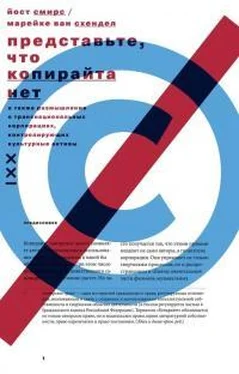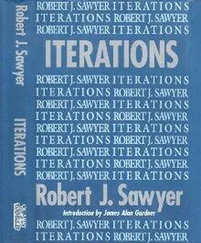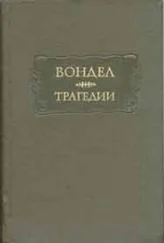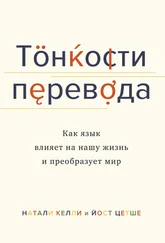Йост Смирс - Представьте, что копирайта нет
Здесь есть возможность читать онлайн «Йост Смирс - Представьте, что копирайта нет» весь текст электронной книги совершенно бесплатно (целиком полную версию без сокращений). В некоторых случаях можно слушать аудио, скачать через торрент в формате fb2 и присутствует краткое содержание. Жанр: Публицистика, на русском языке. Описание произведения, (предисловие) а так же отзывы посетителей доступны на портале библиотеки ЛибКат.
- Название:Представьте, что копирайта нет
- Автор:
- Жанр:
- Год:неизвестен
- ISBN:нет данных
- Рейтинг книги:4 / 5. Голосов: 1
-
Избранное:Добавить в избранное
- Отзывы:
-
Ваша оценка:
- 80
- 1
- 2
- 3
- 4
- 5
Представьте, что копирайта нет: краткое содержание, описание и аннотация
Предлагаем к чтению аннотацию, описание, краткое содержание или предисловие (зависит от того, что написал сам автор книги «Представьте, что копирайта нет»). Если вы не нашли необходимую информацию о книге — напишите в комментариях, мы постараемся отыскать её.
Представьте, что копирайта нет — читать онлайн бесплатно полную книгу (весь текст) целиком
Ниже представлен текст книги, разбитый по страницам. Система сохранения места последней прочитанной страницы, позволяет с удобством читать онлайн бесплатно книгу «Представьте, что копирайта нет», без необходимости каждый раз заново искать на чём Вы остановились. Поставьте закладку, и сможете в любой момент перейти на страницу, на которой закончили чтение.
Интервал:
Закладка:
Lewinski S. von. Indigenous Heritage and Intellectual Property. Genetic Resources, Traditional Knowledge and Folklore. — The Hague: Kluwer Law International, 2002.
Litman J. Digital Copyright. — Amherst; New York: Prometeus Books, 2001.
Lovink G., RossiterN. (eds.). MyCreativity Reader. A Critique of Creative Industries. — Amsterdam: Institute of Network Cultures, 2007.
Lovink G. Zero Comments. Blogging and Critical Internet Culture. — New York; London: Routledge, 2008.
Lovink G., Niederer S. (eds.). Responses to YouTube. — Amsterdam: Institute of Network Cultures, 2008a.
Macmillan F. Copyright and corporate power. — In Towse, 2002. — P. 99-118.
Malm K. Copyright and the Protection of Intellectual Property in Traditional Music, Music, Media, Multiculture. — Stockholm: Musikaliska akademien, 1998.
Martel F. De la culture en Amérique. — Paris: Gallimard, 2006.
Maxwell R. (ed.). Culture Works. The Political Economy of Culture. — Minneapolis: University of Minnesota Press, 2001.
McChesney R. W. Rich Media, Poor Democracy. Communication Politics in Dubious Times. — Urbana; Chicago: University of Illinois Press, 1999.
McChesney R. W. Communication Revolution. Critical Junctures and the Future of Media. — New York: The New Press, 2007.
Mossetto G., Vecco M. (eds.). The Economics of Copying and Counterfeiting. — Milano: FrancoAngeU, 2004.
Motavalli}. Bamboozled at the Revolution. How Big Media Lost Billions in the Battle for the Internet. — New York: Viking, 2002.
Naim M. Illicit. How smugglers, traffickers, and copycats are hijacking the global economy. — New York: Doubleday, 2005.
Netanel N. W. Copyrights Paradox. — Oxford; New York: Oxford University Press, 2008.
Nimmer M. B., Getter P. E. International Copyright Law and Practice. — New York: Bender, 1988.
Nimmer M. B., Nimmer D. Nimmer on Copyright: A Treatise on the Law of Literary, Musical and Artistic Property, and the Protection of Ideas. — New York: Bender, 1994.
Nooteboom B. Trust. Forms, Foundations, Functions, Failures and Figures. — Cheltenham: Edward Elgar, 2002.
Nuss S. Copyright & Copyriot. Aneignungskonflikte um geistiges Eigentum im informationeilen Kapitalismus. — Münster: Westfälisches Dampfboot, 2006.
Obüljen N., Smiers J. Unesco’s Convention on the Protection and Promotion of the Diversity of Cultural Expressions. Making It Work. — Zagreb: Culturelink, 2006.
Perelman M. Steal This Idea. Intellectual Property Rights and the Corporate Confiscation of Creativity. — New York, Palgrave, 2002.
Pérez de Cuellar J. Our Creative Diversity. Report of the World Commission on Culture and Develoipment. — Paris: Unesco Publishing, 1996.
Picciotto S. Defending the Public Interest in TRIPS and the WTO. — In Dra-hos, 2002, —P.224-243.
Pietrobelli C., Sverrisson A. Linking Local and Global Economies. The ties that bind. — London: Routledge, 2004.
Polanyi K. The Great Transformation. The Political and Economic Origins of Our Time. — Boston: Beacon Press, 1957.
Pugatch M. R, Jensen A. Healthy IPRs. A Forward Look at Pharmaceutical Intellectual Property. — London: The Stockholm Network, 2007.
Renschler R. The Entrepreneurial Arts Leader. Cultural Policy, Change and Reinvention. — Queensland: The University of Queensland press, 2002.
Ricketson S., Ginsburg J. C. International Copyright and Neighbouring Rights: The Berne Convention and Beyond. — Oxford: Oxford University Press, 2006.
Rifkin J. The Age of Access. The New Culture of Hypercapitalism, Where AU of Life is a Paid-for Experience. — New York: Jeremy P. Tarcher; Putnam, 2000.
Rose M. Authors and Owners. The Invention of copyright. — Cambridge, Mass.: Harvard University Press, 1993.
Rossiter N. Organized Networks. Media Theory, Creative Labour, New Institutions. — Rotterdam: NAi, 2006.
Rushdie S. Shame. — London: Picador, 1993.
Said E. W. Culture and Imperialism. — New York: Alfred A. Knopf, 1993.
Schiller D. Digital Capitalism. Networking the Global Market System. — Cambridge: MA; London: The MIT Press, 2000.
Sherman B., Strowel A. (eds. ). Of Authors and Origins: Essays on Copyright Law. — Oxford: Clarendon Press, 1994.
Shiva V. Biopiracy. The Plunder of Nature and Knowledge. — Boston MA: South End Press, 1997.
Shiva V. Protect or Plunder? Understanding InteUectual Property Rights. — London: Zed Books, 2001.
ShohatE., Stain R. Unthinking Eurocentrism. Multiculturalism and the Media. — London; New York: Routledge, 1994.
Shulman S. Owning the Future. — New York: Houghton Mifflin Company, 1999.
Siwek S. E. Copyright Industries in the U.S. Economy. — Washington: Economists Incorporated, 2007.
Smiers J. État des lieux de la création en Europe. Le tissu culturel déchiré. — Paris, 1998.
Smiers J. La propriété intellectuelle, c’est le vol! Plädoyer pour l’abolition des droits d’auteur. — In Le Monde Diplomatique, Septembre, 2001.
Smiers J. Arts Under Pressure. Promoting Cultural Diversity in the Age of Globalization. — London: Zed Books, 2003.
Smiers J. Artistic Expression in a Corporate World. Do We Need Monopolistic Control? — Utrecht: Utrecht School of the Arts, 2004.
Smiers J. Creative Improper Property. Copyright and the Non-Western World. — In Third Text, Vol. 22, Issue 6, November, 2008. — P. 705-717.
Stallabrass J. Art Incorporated. The Story of Contemporary Art. — Oxford: Oxford University Press, 2004.
Tadelis S. The Power of Shame and the Rationality of Trust. — München: Hans Möller Seminar, 2006.
TapscottD., Williams A. D. Wikinomics. How Mass Collaboration Changes Everything. — New York: Portfolio, 2008.
Thomas P. N., Nain Z. (eds. ). Who Owns the Media? Global Trends and Local Resistances. — London: Zed Books, 2004.
Toulouse J. M. L’Entrepreneurship au Quebec. — Montreal: Les Presses H. E. C., 1980.
Toynbee J. Creating Problems. Social Authorship, Copyright and the Production of Culture. — Milton Keynes: The Pavis Centre for Social and Cultural Research, 2001.
Towse R. Copyright, Incentive and Reward. An Economic Analysis of Copyright and Culture in the Information Age. — Rotterdam: Erasmus University, 2000.
Towse R. (ed.). Copyright in the Cultural Industries. — Cheltenham: Edward Elgar, 2002.
Towse R. ( ed. ). A Handbook of Cultural Economics. — Cheltenham: Edward Elgar, 2003.
Towse R. Copyright and Cultural Policy for the Creative Industries. — In Grandstand, 2002. — P. 1-10.
Towse R. Copyright and Economics. — In Frith and Marshall, 2004. — P. 54-69.
Towse R. Copyright and Creativity. Cultural Economics for the 21st Century. — Rotterdam: Erasmus University, 2006.
Utton M. A. Market Dominance and Antitrust Policy. — Cheltenham: Edward Elgar, 2003.
Vaidhyanathan S. Copyrights and Copywrongs. The Rise of Intellectual Property and How It Threatens Creativity. — New York; London: New York University Press, 2001.
Vaidhyanathan S. The Anarchist in the Library. How the Clash Between
Freedom and Control is Hacking the Real World and Crashing the System. — New York: Basic Books, 2004.
Wendland W. Intellectual Property and the Protection of Cultural Expressions. The Work of the World Intellectual Property Organization (WIPO). — In Grosheide,2002. — P. 102-138.
Читать дальшеИнтервал:
Закладка:
Похожие книги на «Представьте, что копирайта нет»
Представляем Вашему вниманию похожие книги на «Представьте, что копирайта нет» списком для выбора. Мы отобрали схожую по названию и смыслу литературу в надежде предоставить читателям больше вариантов отыскать новые, интересные, ещё непрочитанные произведения.
Обсуждение, отзывы о книге «Представьте, что копирайта нет» и просто собственные мнения читателей. Оставьте ваши комментарии, напишите, что Вы думаете о произведении, его смысле или главных героях. Укажите что конкретно понравилось, а что нет, и почему Вы так считаете.









